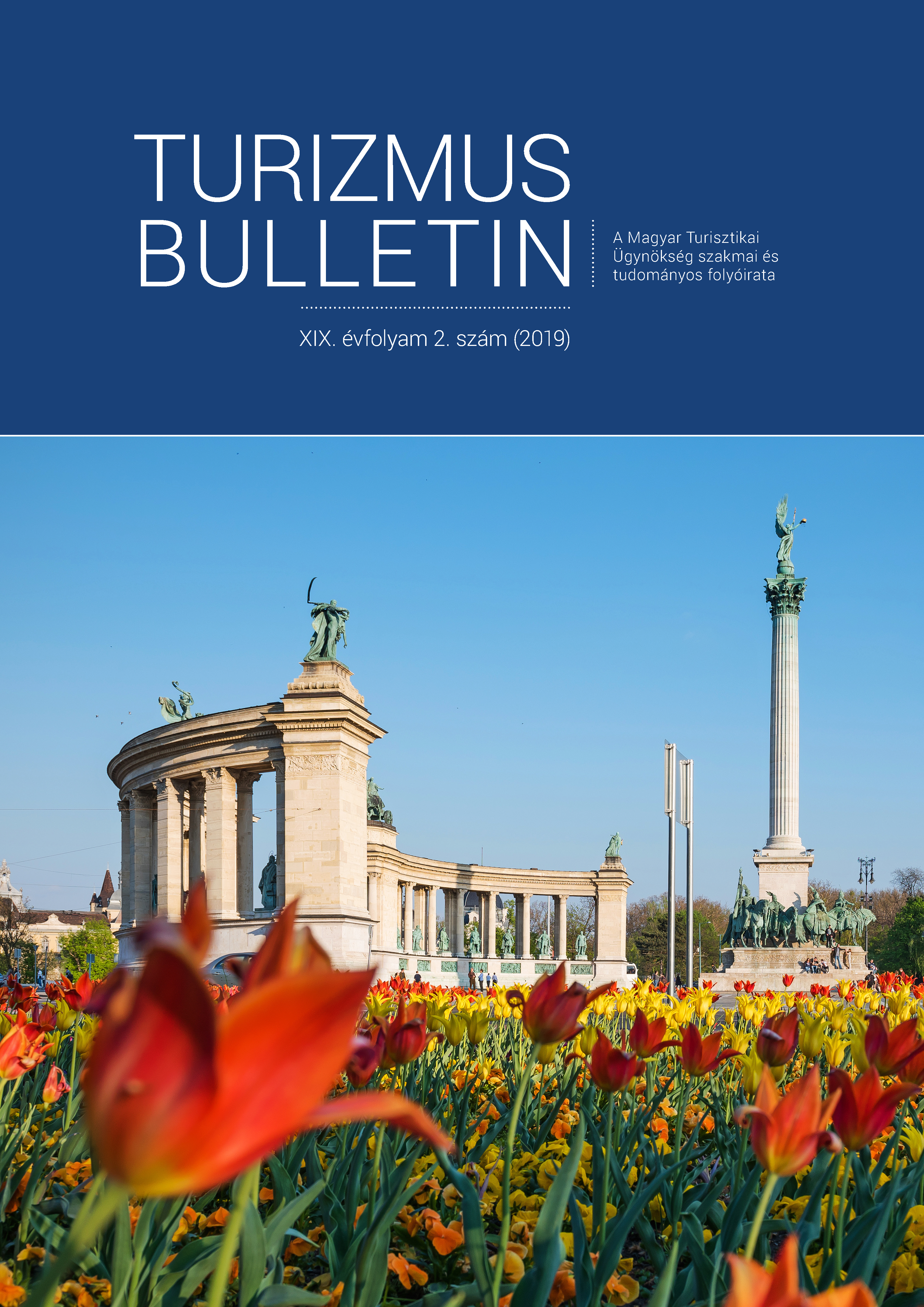Egy nagyszabású rendezvény hatása a rossz városimázsra: Ferenc pápa látogatásának befolyása Juarez város megítélésére
DOI:
https://doi.org/10.14267/TURBULL.2019v19n2.3Kulcsszavak:
városmarketing, városmárkázás, pápa látogatásaAbsztrakt
A tanulmány célja, hogy egy negatív megítélésű város példáján keresztül mutassa be a városimázs javításának lehetőségeit. Ehhez a pápalátogatás nagyszabású rendezvényének lehetséges imázsjavító hatásait elemeztük a mexikói Juarez város példáján keresztül. Az elméleti áttekintés részeként bemutatjuk a városmarketing és városmárkázás fogalmait, majd az Anholt-féle városmárka hatszög segítségével értelmezzük Juarez helyzetét. A pápalátogatás szerepét online turisztikai oldalak és online médiatartalmak segítségével elemeztük és megállapítottuk, hogy az esemény médiafigyelme és pozitív üzenete megadta a lehetőséget a város megítélésének javítására, azonban a külső adottságok, a mélyben rejlő strukturális problémák nem tették lehetővé ennek kiaknázását.
Hivatkozások
ANHOLT, S. (2006): The Anholt-GMI city brands index: How the world sees the world's cities. Place branding. 2(1). pp. 18–31.
ASHWORTH, G. J. – VOOGD, H. (1990): Selling the city: Marketing approaches in public sector urban planning. Belhaven Press: London.
BRAUN, E. – ZENKER, S. – KAVARATZIS, M.(2013): My city – My brand: The different ro-les of residents in place branding. Journal of Place Management and Development. 6(1). pp. 18–28.
DURAN, R. D. (2014): Elaboración del duelo de una madre cuyo hijo trabajaba como sicario en Ciudad Juárez, Chihuahua. Nóesis: Revista de Ciencias Sociales y Humanidades. 23(46). pp. 224–245.
FAN, Y. (2006): Branding the nation: What is being branded? Journal of Vacation Marketing. 12(1). pp. 5–14.
FLORIDA, R. (2014): The Rise of the Creative Class: And How It's Transforming Work, Leisure, Community, and Everyday Life. Brilliance Audio, Unabridged edition.
GOLD, J. R. – GOLD, M. M. (2008): Olympic ci-ties: regeneration, city rebranding and chang-ing urban agendas. Geography compass. 2(1). pp. 300–318.
GREENBERG, M. (2000): Branding cities: A social history of the Urban Lifestyle Magazine. Urban affairs re vie w. 36(2). pp. 228–263.
GYŐRI, E. B. (1998): Az ország megítélése külföldi szemmel. Marketing és Menedzsment. 32(3). pp. 47– 52 .
HERSTEIN, R. – BERGER, R. – JAFFE, E. (2013): Five typical city branding mistakes: Why cities tend to fail in implementation of rebranding strategi-es. Journal of brand strategy. 2(4). pp. 392–402.
HOSPERS, G. J. (2010): Making sense of place: from cold to warm city marketing. Journal of place and management. 3(3). pp. 182–193.
KAVARATZIS, M. (2007): City Marketing: The Past, the Present and Some Unresolved Issues. Geography Compass. 1(3). pp. 695–712.
KAVARATZIS, M. – ASHWORTH, G. (2005): City branding: An effective assertion of identity or a transitory marketing trick? Economische en Sociale Geografie. 96(5). pp. 506–514.
KOTLER, P. (2002): Marketingmenedzsment. KJ K-Kerszöv, Budapest. p. 39.
MOLNÁR-CSOMÓS, I. (2017): Országimázs-építés Magyarországon. MSc szakdolgozat. Budapesti Gazdasági Egyetem, Budapest. p. 13.
MÜLLER, M. (2012): Popular perception of urban transformation through megaevents: unders-tanding support for the 2014 Winter Olympics in Sochi. Environment and Planning C: Politics and Space. 30(4). pp. 693–711.
OL I N S, W. (2002) Branding the nation – The his-torical context. Journal of Brand Management.9(4/5). pp. 241–248.
OOI, C.-S. (2013): Why are cities becoming alike when each city is branded as different? CLCS Working Paper Series. Copenhagen Business School. pp. 1–18.
PAPP-VÁRY, Á. (2006): Az országmárká-zás elmélete és gyakorlata. rekláMérték. Kommunikációelméleti szaklap. 4(34). pp. 1–11.
PAPP-VÁRY, Á. (2011): The Anholt-GMI city brand hexagon and the Saffron European City Brand barometer: A comparative study. Regional and Business Studies. 3(1). pp. 555–562.
PISKÓTI, I. (2012): Régió- és településmarke-ting – Marketingorientált fejlesztés, márkázás. Akadémiai Kiadó Zrt, Budapest.
RAMOS, M. J. (2011): La marca ciudad y el uso de la web 2.0 como filtro de la realidad y prevención de una crisis (City Branding and Web 2.0, the reality and its prevention in crisis circumnstan-ces). Razon y palabra, Semiótica y comunicologia: Historias y propuestas de una mirada científica en construcción. 72. pp. 1–26.
RICHARDS, G. – WILSON, J. (2004): The impact of cultural events on city image: Rotterdam, cultural capital of Europe 2001. Urban studies. 41(10). pp. 1931–1951.
RIEZEBOS, R. (2009): City Branding, sense or non-sense? White Paper of the European Institute for Brand Management, European Institute for Brand Management: Rotterdam.
SCHEEL, C. – PINEDA, L. (2014): Innovacities.Monterrey: UTADEO.
SARTORI, A. – MOTTIRONI, C. – CORIGLIANO, M. A. (2012): Tourist destination brand equity and internal stakeholders: An empirical research. Journal of Vacation Marketing. 18(4). pp. 327–340.
ZHANG, L. – ZHAO, S. X. (2009): City branding and the Olympic effect: A case study of Beijing. Cities. 26(5). pp. 245–254.
Internetes források
ACI PRENSA VATICANA (2016): Discursos del viaje apostolico a Mexico en Febrero 2016 (Speeches from Pastoral trip to Mexico in February, 2016). https://www.aciprensa.com/noticias/todos-los-discursos-homilias-y-men-sajes-del-papa-francisco-en-mexico-53969, Letöltve: 2017. augusztus 1.
ANTTIROIKO, A.-V. (2015): Interview with Ari-Veikko Anttiroiko on City Branding as Strategic Management Tool for Local Governments. The Place Brand Observer. http://placebrandobser-ver.com/ari-veikko-anttiroiko-city-branding/, Letöltve: 2017. augusztus 1.
CBC (2018): Calgarians don't want to host Olympics, ac-cording to poll. https://www.cbc.ca/news/cana-da/calgary/calgary-olympic-2026-poll-cbc-cal-gary-1.4894146, Letöltve: 2019. január 24.
EL PASO TIMES (2016a): Statue of Pope Francis being built in honor of visit. https://eu.elpasotimes.com/story/news/local/juarez/pope/2016/02/01/statue-pope-francis-being-built-honor-visit/79666000/, Letöltve: 2018. szeptember 28.
EL PASO TIMES (2016b): Juárez seminary readies for Pope Francis' visit. https://eu.elpasotimes.com/story/news/local/juarez/2016/01/07/juarez-seminary-readies-pope-francis-visit/78437090/, Letöltve: 2018. szeptember 28.
HOJE-TAASTRUPP KOMMUNE (2010): Creative City Challenge: A branding framework. The Interreg IVB North Sea Region Programme. pp. 4. http://archive.northsearegion.eu/files/repository/20100816173849_A_Branding_Framework.pdf, Letöltve: 2017. augusztus 10.
IPSOS MORI (2010): Papal Visit Poll. https://www.ipsos.com/ipsos-mori/en-uk/papal-visit-poll, Letöltve: 2019. január 24.
MARTÍNEZ, A. (2004): Planificación estratégica y la imagen de la ciudad. (Strategic planning and city’s image). I Congreso Citymarketing Elche 2004, Elche. http://www.ciudadreal.es/planestrategico/Planif_estr_e_imagen_ciudad_Elche.pdf, Letöltve: 2019. január 24.
NEW YORK TIMES (2016): Poll Finds Strong Opposition Among Brazilians to Rio Games. https://www.nytimes.com/2016/07/20/sports/olympics/poll-finds-strong-opposition-among-brazilians-to-rio-games.html, Letöltve: 2019. január 24.
PLAN ESTRATÉGICO DE CIUDAD JUÁREZ (2016): Informe Así Estamos Juarez 2016 (We are Juarez 2016). Ciudad Juárez: Plan estratégico de Ciudad Juárez. https://planjuarez.org/wp-content/uploads/2018/12/informe_AEJ_2016.pdf, Letöltve: 2019. január 24.
REYNOLDS, T. (2011): The rise and fall of native communities at the Old El Paso del Norte Mission.http://www.donaanacountyhistsoc.org/HistoricalReview/2011/HistoricalReview2011.htm, Letöltve: 2017. augusztus 15.
VAN GELDER, S. (2008): An introduction to city branding.Placebrands Ltd. pp. 1. https://www.zukunft-metropole.at/Downloads/An_Introduction_to_City_Branding_Sicco_van_Gelder.pdf, Letöltve: 2017. augusztus 15.

